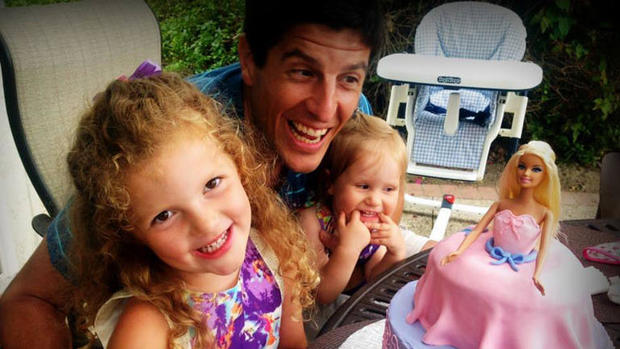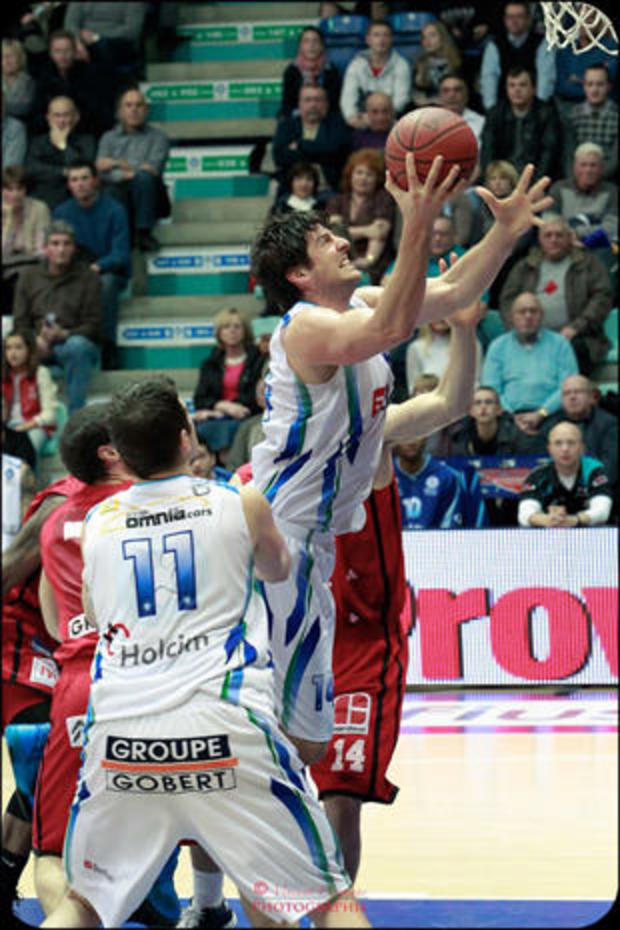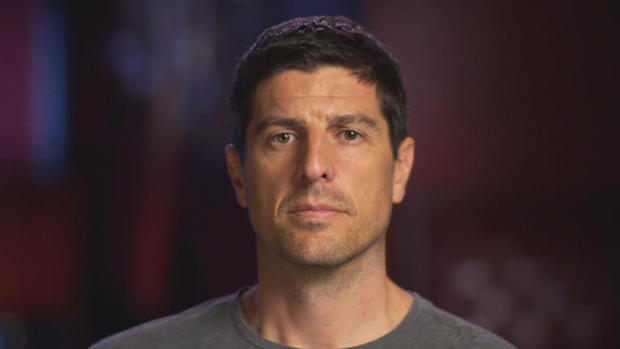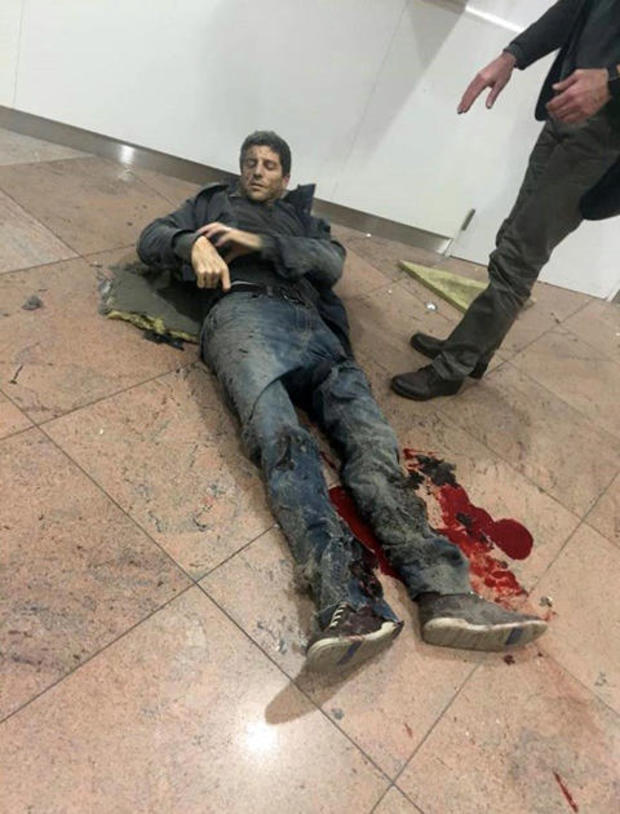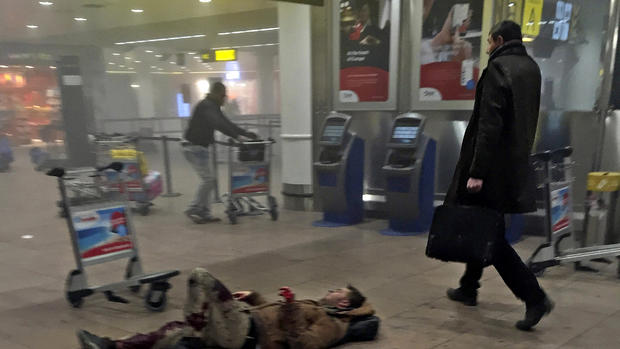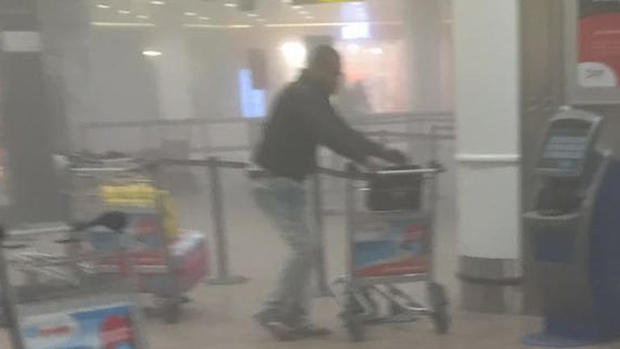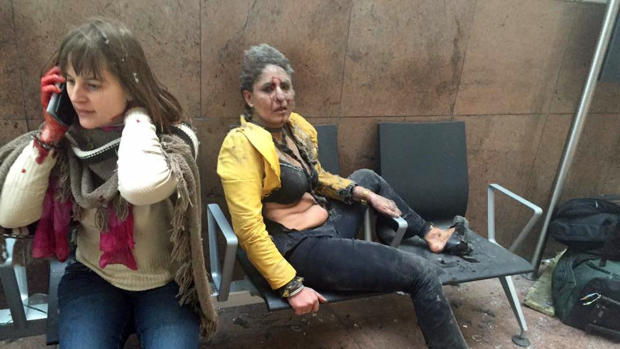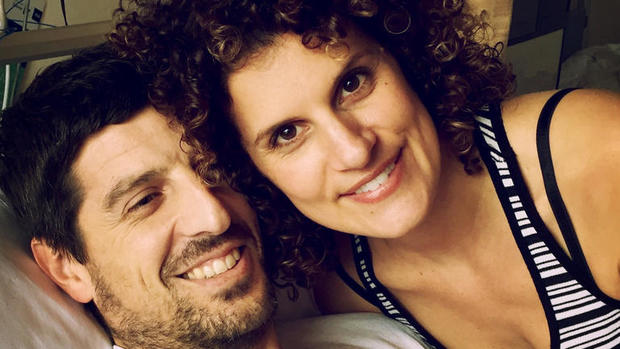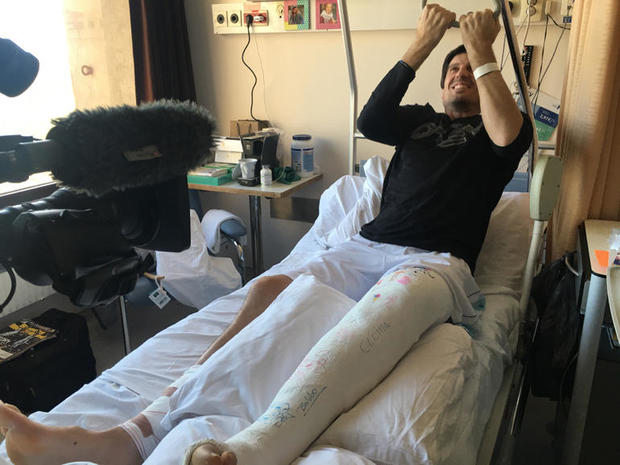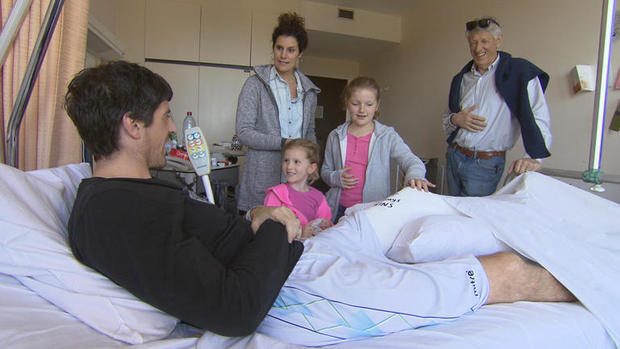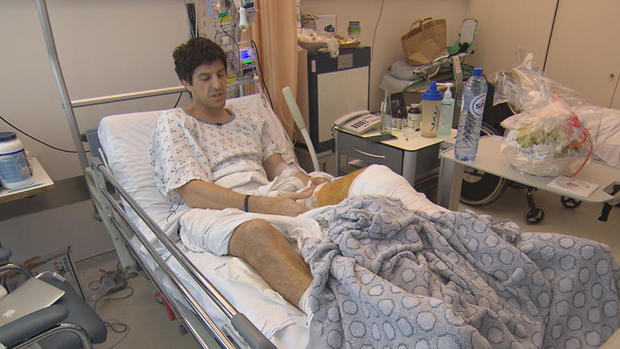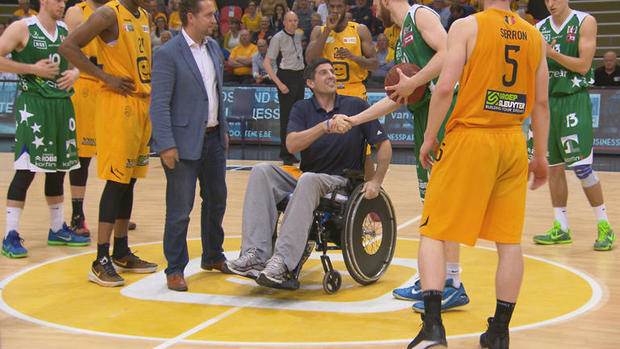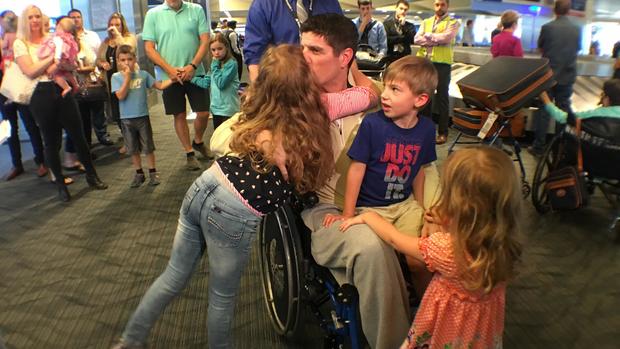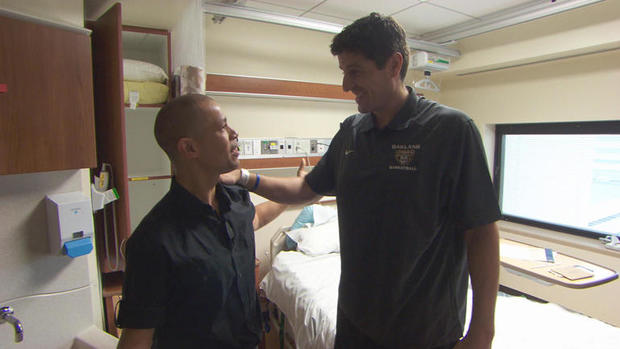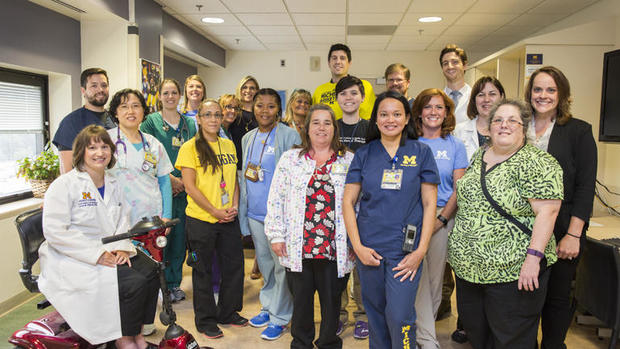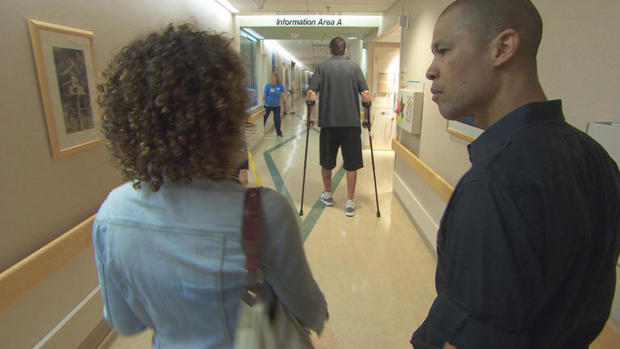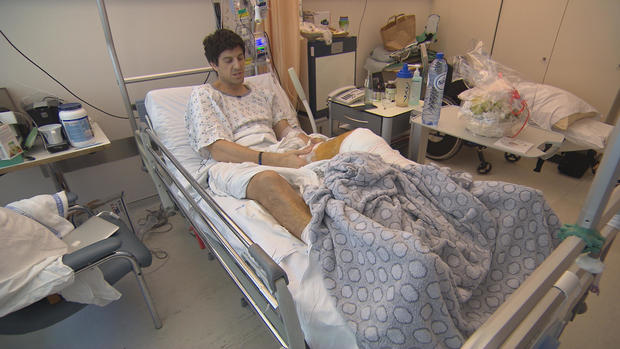"48 Hours" Live to Tell: The Long Road Home
Produced by Chris Young Ritzen, Ruth Chenetz and Michelle Fanucci
[This story originally aired on Nov. 26, 2016]
BATTLE CREEK, MICH. --"You want to grow up experiencing things that dads do. You just can't picture not being part of their life, you know you can't picture not being there for them," said Sebastien Bellin.
"Not many people get to pinpoint that specific point in their life where you're life changed," he said.
BRUSSELS, BELGIUM | MARCH 22, 2016
"I'm thinking I gotta make it, I gotta make it, I gotta make it, I gotta see my daughters again. I gotta see my girls. That whole time you're fixated on that one thing and you don't want to let any negative thoughts into your mind at all," Sebastien said from his hospital bed in Brussels. "You're about to die. I can remember just fixating on a point on the ceiling and just being like, 'OK now, they're not gonna get me, They're not gonna get me...'"
"The power of an explosion, it just shatters everything. It not only broke my bones, but it exploded my muscle tissue around my bones."
"You have life kind of like pull the rug right from under you," said Sara Bellin, Sebastien's wife.
"I knew I had an advantage during the attack," Sebastien explained. "I played 15 years professional. …Any athlete has to push their limits."
"There are lots of things that took place that happened for him to make it and if you take one of those away, I don't know if he would've survived," said Sara.
"At that time, I didn't really care whether I had legs or not, I just was gonna be alive. I was going to be able to see Sara, Cecilia and Vanessa again. …And so that became my motivation really, throughout the --" Sebastien breaks down – "it was my two little girls."
THE ATTACK
"I mean, to think I was 30 yards away from a blast and life said … 'it's not your time yet,'" Sebastien Bellin said from his hospital room in Brussels. "For what reason? I don't know. But I was truly, truly lucky. "
"I had no fear. I've never been scared of flying, never thought twice about being in certain areas," he said. "You know traveling is such a second nature for me."
Sebastien Bellin has spent much of his life on planes. Born in Brazil to Belgian parents, his father's job as an international businessman took him all over the world, including the United States, where he played college basketball.
"Basketball became kinda my sport because I just didn't stop growing," he said. "I think I had a lot of friends who were like, 'Dude, you can't play soccer. You are 6'9". You can't play soccer.'"
First he played at Marist College in New York and then transferred to Oakland University in Rochester, Michigan, where he met his wife, Sara.
After marrying, they relocated to Europe, where Sebastien continued his basketball career playing professionally.
"He was a … spirited guy. You know, 'Come on guys, we can do this.' Really emotional and passionate. Wanting to win. And wanting to win as a team," said Sara.
"So we were living the good life, I mean it was fun," said Sebastien. "And then little Cecilia came along in 2008. …And in 2012 Vanessa came along."
"You come home to your daughters … the basketball side, everything's that's been your focus changes. …That's what matters."
So, after a long 15-year career Sebastien retired. He moved his family to Sara's hometown of Battle Creek, Michigan, and became a partner in a sports streaming startup; a job that required travel between Europe and the United States.
"You know, I was traveling probably two weeks out of every month. I was -- I was on the road," he said.
"When Sebastien started traveling and taking airplanes a lot… I -- didn't love it, but I don't love flying since what's happened with 9/11, it's kind of spooked me," Sara explained. "And then I also would push it out and be like, 'Sara, let's be realistic. What's the likelihood of something happening?'"
MARCH 6, 2016 | 16 DAYS BEFORE THE BOMBINGS
"Sebastien flew out, it was the 6th of March. It was a Sunday 'cause I remember that I was baking a cake with the girls for my sister's birthday," Sara said. "Looking back, at those photos I would get teary-eyed because for one, I knew that was the day that he left for this trip. And it was carrot cake we were making and he loves carrot cake."
Sebastien was heading to Brussels on yet another business trip. But this time, he was traveling during an especially dangerous period.
Four months earlier, terrorists killed 130 people and wounded more than 350 in the worst terrorist attack in Paris history.
"The atmosphere in Brussels was tense, because they had found that a lot of these terrorist attacks in Paris were coordinated and originated from one of the suburbs of Brussels," said Sebastien.
Just days before Sebastien was to fly home, two of the terrorists involved in the Paris attacks were arrested in the outskirts of Brussels.
"So I really feel that the days leading up to March 22, I started getting gut feelings … 'You're not safe,'" he said.
MARCH 21, 2016 | ONE DAY BEFORE THE BOMBINGS
"I remember … being at a restaurant with my good friends," Sebastien recalled. "And there was a lotta talk about what are the consequences of these arrests? …And the restaurant had huge glass windows overlooking the street. …And I remember thinking … 'If terrorists decide to go down this street, and start, shootin' up, this restaurant, there's nowhere to hide.'"
"The last time I spoke with him was via text. And he was just heading to bed," Sara said. "It was already really late there."
Sebastien was flying home.
"And then we were spending the long Easter weekend together as a family," said Sara.
MARCH 22, 2016 | BRUSSELS AIRPORT
"I get dropped off by one of my colleagues-- at the airport."
"A lot of flights go in and out … Very open, you know, very easy. You can park right in front of the airport," Sebastien explained. "I remember seeing the -- the clock on -- on the car, 7:45. And I immediately go check in. My flight was like at 9:10 a.m. or something like that. So not a lotta t-- not a lotta time to-- to check in. So -- I run to the … to the check-in counter. Get my boarding pass. …I was one of the last ones to check in."
While Sebastien was checking in, at 7:55 a.m., three members of an ISIS cell with ties to the Paris attacks were entering the airport. Each one, pushing luggage containing a bomb.
"There's not a worry on my mind. …Everything's -- everything's right," he recalled. "And then in, within a span of three minutes … my life changes."
"I see the blast, and I felt -- I felt the blast, but I didn't get hit. I escaped it. …I remember looking back and seeing the tunnel from where the blast went off just collapsing. And I started hearing screams. And I immediately knew … that a bomb went off.
"And I immediately start running. … you want to run towards the gate where there's policemen with guns.
"So don't run outside, don't run. Because you don't know where the second bomb will come from if there's a second bomb. You don't know anything. So in a split of a second, I had to decide, 'Do I run outside or do I run towards the gates?' … and I ran towards the gates.
"When death is right in front of you … you get a lotta clarity. …because the things that flash in front of you are all the things that you would regret if you died at that -- at that moment.
"And I remember running faster than some people. I'm like, you know, dodging people trying to get by them. …I think that I had made it. You know I think I escaped something. But then, yeah, the second one caught me."
SURVIVAL INSTINCTS
"The violence of an explosion just rocks you. It projects you forward for two or three seconds, you don't know what hits you," said Sebastien.
"All I know is, I was coming to my senses and I'm leaning on one side… And I knew I needed help. So I start, you know, I tried crawling, but crawling is so inefficient because there is so much debris around you … So I start waving my hands and screaming … to try to get attention. And a minute or two later, luck has it, I just feel a tug on my arm. …And somebody starts pulling me and my first instinct was, 'if they start pulling you, your left leg is not going to come with you.' So I reach down and hold onto my left leg. …And he drags me, I'd say, 10, 20 yards to behind the column. …And I look down at my hip … You know, I just have just bone and flesh just sticking out from just underneath my belt. …So then I start seeing about my legs, and I could just see the pools of blood already, you know, around both legs …
"I'm just so focused on the instinct of survival. …so I didn't realize there was a photographer there taking my picture."
The photographer was Ketevan Kardava, a foreign correspondent for the country of Georgia. She had been checking in for her flight when the bombing occurred.
"I saw many passengers with their legs blown up," she said.
"I took only 12 pictures, and I had only one minute. So 12 pictures in a minute. …I call them my photo heroes," Kardava said. "It was very terrible to realize what has happened."
"There was a dead woman right next to me. And she was like all white," Sebastien said. "And I remember a wedding ring, like looking at her hand, and I remember a wedding ring and suddenly I started thinking of my girls and Sara. And I said, 'If you stay here with all the blood, with your sweating, you're gonna die.'"
"In the morning I'd always … go to his account to see what he sent. He'd always sent really nice messages and things and I got nothing," said Sara.
"I know from basketball and from injuries, the more your feet are elevated, you know, the less blood will flow into them. So … I saw a gray suitcase, and I asked for somebody to bring me over that gray suitcase.
"The pain you feel of actually someone lifting your almost detached legs onto a suitcase is excruciating. And then, to my right, I remember seeing a scarf as well, lying on the ground. So I asked someone to bring over the scarf and to use it as a tourniquet … around my right leg.
"I could see also how much blood I was losing. …And so it -- it immediately whipped me into shape saying, 'you need to get outta here.' …And so I look around, and I saw a luggage cart … I told someone to bring over the baggage cart, and they lifted me up onto the cart. And that was the second time I felt excruciating pain.
"And so I asked somebody to push me to the front of the airport. I said, 'Look -- I gotta get in an ambulance.' And they were all like, 'No, you have to stay, you cannot move … We have to secure the airport.' I started saying, 'If I stay here and die, it's on your conscience. This is on you.'
"And finally, you know, they … pushed me to the front of the airport. I remember the push. …A few seconds later about, firemen come around a corner. And they pick up, I remember them trying to push me through the rubble, and they couldn't do it. So they just picked me up. And they carried me outside.
Two terrorists had died when their bombs went off. A third bomb never exploded, and the terrorist carrying that one, "the man in the hat," was on the run.
It had been nearly two hours since Sebastien was hit by a bomb -- he had lost 50 percent of his blood. Finally, he was on his way to the hospital.
"They ask me for a phone number. And -- you know, that's actually the first time I panicked. I didn't -- I couldn't remember a phone number. And so I was like, 'How am I gonna get Sara the news? How am I gonna get my girls the news that I'm alive, that I'm -- I made it.' And -- I gave my in-laws landline, which is a number that I've memorized for 18 years. And that's the one I gave and I was, 'please answer the phone.'"
"I got a phone call from my mom," Sara said. "I didn't realize at the moment how -- major, how big the terrorist attack was … It was all about Sebastien at that point.'Ok, well he's hurt. So how hurt is he?'"
By now, Kardava, started posting about the attack on social media.
"And [the] first photo, I posted, it was a photo of Sebastien," she said. "For me, it was most important to show everyone … as many say, is the face of terrorism."
"And I immediately went to Facebook, because that's where the news is quickly. And I saw the photo of Sebastien lying on the ground," Sara explained, her voice breaking. "I remember I was screaming with terror, you know, and -- 'cause he was down on the ground and -- just thinking about he could've died or, 'Is there still a chance that he could die?' there were so many things going through my mind at that point."
"The whole purpose was just to get out alive. So you start telling yourself, 'Well, if I lose -- if I lose my left leg, I'm OK.' …and they put me under to sleep and I don't, don't remember anything after that."
SAVING SEB
Two hours after the bombings, Sebastien Bellin finally made it into the operating room of Dr. Dimitrios Koulalis.
ERASME HOSPITAL | BRUSSELS, BELGIUM
"In my mind-- it was the worst case scenario," Dr. Koulalis said. "When you have patients coming out of an explosion, you cannot always find immediately -- the injuries. So you're always afraid that there's something that you missed."
Sebastien's right hip and left leg were shattered. Shrapnel from the explosion ripped through his leg leaving muscle and bone exposed.
"This is the fracture of his left leg of the left tibia. You can see multi-fragmented, many fragments. All these are pieces of bone. And the fibula is broken as well," Dr. Koulalis said referring to an X-ray.
Dr. Koulalis and his team spent four hours stabilizing the fractures with a brace, controlling the bleeding and removing the shrapnel -- all the while knowing more surgeries would be needed.
"I woke up from surgery. You're so tired, you're so drained, emotionally and physically that there's not a lot of room to digest what happened," Sebastien explained. "It's not until later that I realized that there was an attack on the metro as well."
At 9:11 a.m. that same morning, another suicide bomber attacked the Maalbeek subway station in the heart of Brussels. Between the two attacks, over 300 were injured and 32 people had lost their lives; they included people of 14 nationalities, including Americans -- mothers, fathers, students, teachers and even a pair of siblings who were on their way to visit their favorite city, New York.
"Life is just, you know it's on threads. It's –" Sebastien sighed from his hospital bed, "-- you need a lot of luck in these situations."
"I remember being extremely impatient and desperate to hear his voice and actually hear that he's OK," said Sara.
"The first conversation I had with Sara, I tried to reassure her. … I said, 'No, look, I'm alive I'm OK, everything's gonna work out.'"
"I didn't believe that he was completely OK. You know I didn't trust it in his voice. You know your spouse, you know and you can tell if they're OK or not. So I maybe calmed down a bit," she said.
FOUR DAYS AFTER THE BOMBINGS
"When I first arrived to the hospital," Sara recalled, "I just remember being so excited to see him.
"We both did cry. There were tears. But, that's the time of, I mean I can't stop smiling, because I remember that it's just that feeling of he's here and I can hug him," a beaming Sara continued. "We can do this. We're together. He made it."
EIGHT DAYS AFTER THE BOMBINGS
CBS News correspondent Vladimir Duthiers was in Brussels covering the attacks when he first met Sebastien Bellin.
"The one thing I'm trying to ask myself all the time is, 'How'd I get through this? I would've signed on the dotted line just to be alive and see my two girls again," Sebastien told Duthiers.
And Duthiers was there when Sebastien's father, stepmother, and two younger brothers flew from California and paid him a surprise visit.
"What are you doing? You can't do that to me," Sebastien said breaking into tears, then laughter as he and his father embraced. "Oh man, you gotta give me a little heads up after all this."
"He and his dad are really close," Sara said. "For him to be able to see his dad again … And everything he had been through. I mean he just let it go."
The big question: would Sebastien ever walk again? Over several weeks, he had four more surgeries to repair the fractures. Now, it was a waiting game.
"I look forward to challenge myself to get back to where I was before," he said.
"He's a fighter. He's a man of positive thinking," Dr. Koulalis observed. "That's something every doctor hopes to have on his patient."
In the days after the bombings, tension is high and security is increased throughout Belgium -- the manhunt for the terrorists is intense.
17 DAYS AFTER THE BOMBINGS
In the suburbs of Brussels, police arrest some of those involved in the bombings, including the key player, Mohammed Abrini, "the man with the hat."
40 DAYS AFTER THE BOMBINGS
Sebastien's spirits are lifted when his daughters,Cecilia and Vanessa, travel from Michigan to visit him in Brussels.
"It's unbelievable to think that I was very close to never seeing them again. … and they just walk into the room and everything's great," says Sebastien. "I think kids need to touch. You know they need to be present."
Sebastien leans over and picks up Vanessa and says, "Come here," Sebastien says, leaning over to pick up Vanessa. She hesitates and says, "no."
"Why are you afraid? Do you think you are going to hurt my -- you are not going to hurt that," he tells her, knocking on his cast. "You don't have to worry. It's all better."
"Facetime is great. …But to see the actual cast, to touch it, they see that their dad is getting better. You know -- is healing," said Sebastien.
While Vanessa sits on Sebastien's lap, he asks her some questions:
Sebastien: So what happened to Papa's – why did Papa hurt his leg?
Vanessa: Because of the bad guys.
Sebastien: Because of the bad guys?
Vanessa: [Nods yes]
Sebastien: What did the bad guys do to Papa?
Vanessa: Hit him.
Sebastien: They hit me?
Vanessa: [Nods yes]
Sebastien: And then the leg was all broken because they hit me?
Vanessa: [Nods yes}
Sebastien: But where are the bad guys?
Vanessa: In jail.
Sebastien: Ok. So we are all good, right?
Vanessa: [Nods yes]
Sebastien: I'm very happy to see you.
Vanessa: Tough boy [pats Sebastien on the chest]
Sebastien: Tough boy. Why are you saying tough boy?
Vanessa: Because you are strong. [She flexes her muscle]
When it comes time for Sara and the girls to go back to Michigan, Sebastien can't go with them. After enduring five surgeries, he needs one more. This one will determine whether he will be able to walk again.
"I'm a little bit anxious about the surgery, but I'm really looking forward to it," says Sebastien.
"They're gonna put a pin through my knee … which will solidify the tibia. The risk when you drill a pin into a bone, is that you increase the chance of infection. …It's a chance I'm willing to take."
BIG STEPS
52 DAYS AFTER THE BOMBINGS
"It's amazing. So, this is the shrapnel that was in my leg that came out," Sebastien says, holding up a test tube with the removed shrapnel. "Good riddance!"
"The operation … I'm just happy it's the last one. It's the sixth one -- the sixth and final one. …It's amazing, just seeing both of the legs … I haven't seen both my legs just almost bare like this in-- in two months," he said, becoming emotional.
"Nothing is taken for granted anymore."
"When you survive something like this, man, there's no one single minute where you don't -- where you don't sit here in complete gratefulness. I fought pretty hard to get here. And it's-- it's almost like it's full circle. "
"This last surgery was on Friday the 13th coincidentally, but the next day was his birthday … so I made a video to his favorite song and … I wanted to put together photos to that song," Sara said. "He was actually thinking of that song when he was down on the ground, and that was something that helped him to get through."
"It was a special birthday. He was alive celebrating you know, turning 38, so that's amazing," she continued.
"That's amazing," Sebastien says watching the video.
"Man, I might have all the birthday presents I need for the rest of my life, but don't -- don't tell my wife that."
75 DAYS AFTER THE BOMBINGS
"This is the first time that I've been outta the hospital, really, since the -- since the attacks," he says, wheeling himself outside and joking, "Is there a speed limit?"
The trip is to a Brussels' basketball arena where Sebastien is heading to cheer on one of his old teams – as they root for his recovery.
"This was home for four seasons. Have some good memories here," he says, taking in the empty arena.
Later, at center court, he addresses the cheering crowd. "Thank you very much for the support."
"I did the jump ball, you know, half court, and see basically, you know, see a 4,000-seat arena just gave me a standing ovation," he said. "Watching guys that I played with … to see it was difficult … I still don't know whether I will be ever able to do sports like I was before. It depends how I heal."
77 DAYS AFTER THE BOMBINGS
"This is a big step. 'Cause it's, you know, it's all about being able to put more and more weight on my hip, which was reconstructed, and on my leg, which was completely reconstructed as well. So it's a big step," Sebastien explains, as he attempts to stand for the first time with the help of his physical therapist.
"Ready?" the therapist asks.
"Let's go," Sebastien replies, as he lifts up from the bed and stands with a walker.
"Feels great" he says as he sits back down, shaking hands with the therapist who says,
"Perfect."
"All six surgeries are done. The follow-up has been done," Sebastien explains. "So everything is positive. The next chapter is, you know, being able to focus 100 percent on rehab, which I'm gonna do at the University of Michigan. …the big thing is for, you know, for my daughters."
"I love him so much -- with kisses on my cheek," said Vanessa Bellin.
"You know, for me to be present again and for me to be -- you know, University of Michigan is an hour away from our house. So it's a step closer. They'll be able to come visit," says Sebastien.
"I love him soooo much," Cecilia Bellin said, her arms wide to show how much. "Tall, strong and big," she continued, looking up.
79 DAYS AFTER THE BOMBINGS
"It's about 4:00 in the morning … It's a big day … I'm l heading home," Sebastien says as he prepares to leave the hospital.
"It's a huge step because you, kind of go from getting fixed to now recovery and getting back to my old self. And that to me is the biggest challenge because will I be able to get back to my old self? Who knows? But, you know, I'm definitely gonna try."
SCHIPHOL AIRPORT, THE NETHERLANDS
"I'm flying out of Amsterdam to go back to Detroit. …Obviously Brussels airport to me is where it all happened. I just don't want to go back there. There's still vivid images of the attack in my mind and I just don't want to wake anything up."
"I wanted the flight to obviously go well. I was concerned about how he would be feeling, if he'd be uncomfortable," said Sara.
DETROIT METROPOLITAN AIRPORT, MICHIGAN
"I'm home. Pretty good feeling," Sebastien says as he deplanes in a wheelchair.
"I was trying to get as many people who could come to be there … he had no idea," Sara said of her homecoming surprise. "We are ready, we are bursting..."
"I'm waiting for Cici and Vi to run to me -- three months in the making, a long time," Sebastien says in an airport elevator, and waits for the doors to open.
WELCOME HOME
"I've been through Detroit airport I don't know how many times so I know exactly where we're heading, but then the wheelchair exits the elevator…" Sebastien recalled of the memory.
"And, I see all my family that are there."
"And all of a sudden it's a realization that, 'hey the toughest part is behind you.' …The road is still long, but you got all these people that got your back."
"The amount of love … that was in that group was just unbelievable. And it's something that I knew I could depend on for the next stage of my rehab."
UNIVERSITY OF MICHIGAN
"I'm quite impressed with how well Sebastien's rebounded and healed, he's taking everything on with a positive attitude," said Dr. Sean Smith, who oversees Sebastien's rehab at the University of Michigan. "And he hasn't had complications and so from that perspective, he's doing quite well. He still has a really long way to go though."
"Here, what I really find besides the physical progress is the mental progress, I really feel confident getting up here and doing these things," Sebastien said during a physical therapy session.
"It's so motivating to keep moving forward."
"I think the hardest injury for Sebastien to overcome is gonna be the left ankle and foot," said Dr. Smith. "It's that he has severe nerve damage.
"We can't predict when someone's gonna be walking, or in Sebastien's case, shooting a jump shot," he continued.
93 DAYS AFTER THE BOMBINGS
"Today is the big going home party. …It's been a while in the making."
"This is gonna be the first time you step foot into your house, just describe how you are feeling," Duthiers says during a visit to the hospital in Michigan – the first time seeing Sebastien in three-and-a-half months.
"When you're so close to death, those are the things that seem so far away … but now that it's there, you're like…'I DID IT!' Like, 'I really did it," Sebastian replies, laughing.
"I know you gotta pack right?" Duthiers notes.
"No-- I'm … mentally I've already been packed for a while," Sebastien replies.
At the University of Michigan, Sebastien was aided by over 15 dedicated teammates who helped him take his first steps.
"I'm extremely grateful for all the people who have helped me in the past and are still currently involved in healing me," he said. "You bond to them because they are part of your rebuilding."
"You know darn well, you are not walking out with this," a physical therapist says, trading Sebastien's walker for a pair of crutches.
"I'm so happy that he lived, obviously, and he's doing so well, but to have to start over a little bit it's like, 'Whoa,'" Sara tells Duthiers as they watches Sebastien walks down the hospital corridor on his own.
"No more hospitals, for long time," Sebastien says as he got into the car, ready to head home.
"Being in the hospital in Belgium for so long you do have to find motivation and the image I always had was being home. …so actually pulling up on June 23rd … and seeing the girls … It was like it came full circle."
Sebastien may be home, but there's no escape from what he has been through. And just three weeks later he gets a sobering reminder – a terrorist attack on a crowded street in Nice, France.
"This is unbelievable. It's tragic," Sebastien says. "It's why this cycle of hate and this cycle of viciousness needs to stop."
"The 32 people that died in Brussels, I think about them all the time."
"I think I've suffered from post-traumatic stress. … [but] I try to defeat it with all the other great things that are happening."
For the first time since the attack, Sebastien is able to retake the basketball court where he once played in college. After 234 days, he's finally back on his feet, making the most out of his second shot at life.
"I'm home and there's not a thing that can stop me now."
"I love life. It's been good to me."
Sebastien Bellin completed a 10 mile race in Antwerp last April.
He plans to run a full marathon in Brussels next October.
